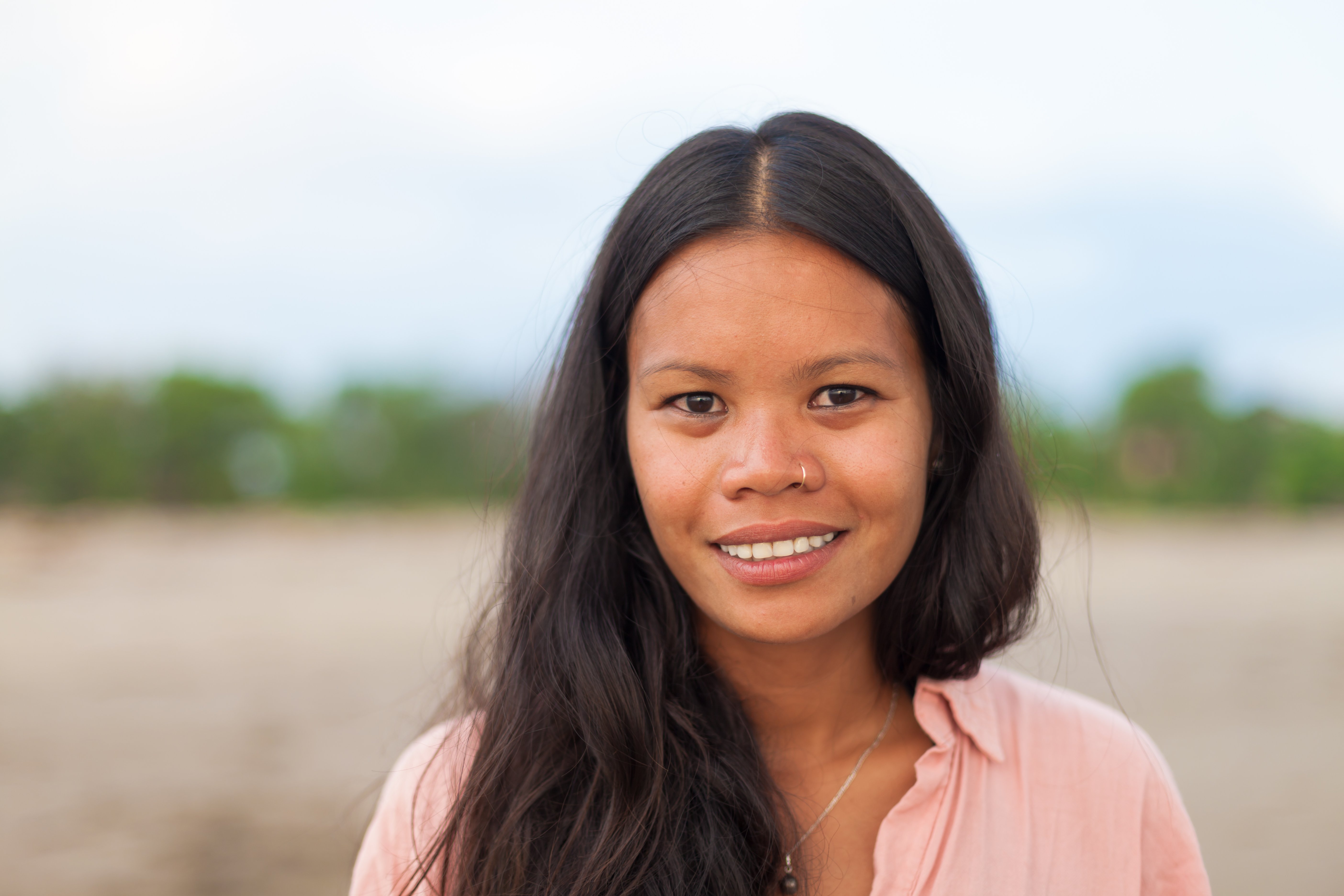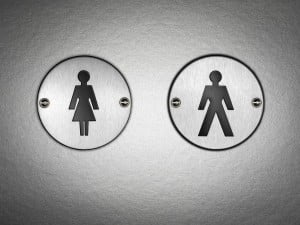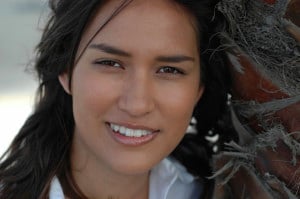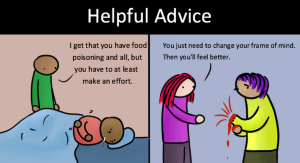
Portrait of a smiling person outside.
I love my tan skin, round nose and dark hair. I love the smell of adobo simmering on the stove in my mom’s kitchen, and the sound of my grandma’s Filipinx accent when she called me nakkóng (“my child” in Ilokano).
Although the factors that contribute to my mental unwellness are undeniably complex, I’ve come to realize that part of my insecurities and issues with self-esteem is also rooted in my very source of pride: being Filipinx American.
Today, I say I’m a Filipinx American woman with pride. But it wasn’t always that way. I didn’t reach this point without hesitation.
I struggled with low self-esteem, poor body image, depression and anxiety before I learned to embrace myself in entirely — ethnic and cultural roots included.
I was embarrassed of having to do things like explain to people how to correctly pronounce my last name, so I Americanized its pronunciation to make it easier.
When I was younger, I aspired to color my hair lighter and wear lighter-colored contacts because I thought it would make me more beautiful.
In college I realized how far removed I felt from my roots after taking Asian American Studies classes and getting involved in student organizing.
I realized how 300 years of Spanish colonization and nearly 50 years of U.S. colonization affected my life and the lives of millions of Filipinxs, particularly through the toxic attitude we’ve developed called colonial mentality.
Colonial mentality is a form of internalized oppression that conditions colonized people to believe that their ethnic or cultural identity is inferior to Western culture or whiteness. Therefore they live their lives striving to be westernized and learning to hate their indigenous roots.
According to Dr. E.J.R. David, a leading scholar in Filipinx American psychology, colonial mentality can lead to low self-esteem and lower life satisfaction because colonized people are taught that everything about them is less-than.
This dissatisfaction could also lead to other health issues like alcoholism, substance use, and suicide ideation.
I wasn’t willing to confront how much I hated my mind and body for being Filipinx until I realized how colonialism reared it’s ugly head in my life. Here’s are some of the ways how:
1. I was conditioned to believe I was different and, therefore, inferior.
I was raised in a predominantly white town in Florida and attended a nearly all-white elementary school. Since 5-years-old, I learned immediately that I was different, but not necessarily in a good way.
Whiteness was the norm and I stood out like a sore thumb.
I got comments about seemingly trivial things like the lunch I brought to school. I loved when my mom made Filipinx food, but this source of pride in my home life became a source of embarrassment when I was among my white classmates.
I lost count of the times I was asked “what is that?” by my classmates as they stared in disdain.
I became incredibly self-conscious and immediately rushed to eat my food so my peers would stop staring at it. Eventually, I altogether asked my mom to stop packing me Filipinx food for lunch to avoid the shame I felt.
I was that ashamed of feeling any ounce of difference among my peers. It was way easier to blend in than face feelings inferior or self-conscious for standing out because of my ethnic identity in any of its facets.
Filipinx food is now going through its own renaissance in the foodie world. What was once a source of embarrassment for me has now become trendy because white people allowed it to be.
The fact that people can’t appreciate my culture at face value without first being coveted hurts like hell.
2. I had poor body image.
I only ever revered actresses or models with eurocentric physical features growing up: pointy noses, pale skin, blue eyes, and blond or brunette hair. It’s all I ever saw in magazines, TV shows or movies.
I had a difficult time seeing the beauty in my own features because I was taught to believe that they weren’t desirable. For much of my life, I felt that I looked undesirable and wished to look more like the white women I revered.
Even the “pretty Asian girls” I went to school with sported a more eurocentric aesthetic: they dyed their hair light, contoured their noses, and wore only American or European brands.
I have a wide, round nose with a flat bridge, a feature that many of my Filipinx family members also share.
When I was a kid, my mom told me she wanted to look “more American,” especially when she immigrated to the U.S. She would pinch the bridge of her nose in an attempt to make it pointier and create more prominent bridge — I eventually learned to do the same.
My eyelid creases also make my eyes appear smaller, or what some of my classmates called “chinky” as they tugged at the corner of their eyes to imitate mine.
Self-consciousness doesn’t quite capture the entirety of how I felt about my physical features: I felt shame and embarrassment, which often led to low self-esteem and depression.
We do so much to aspire to a narrow conception of beauty based on Western, eurocentric standards. We subconsciously try to fit into a box that was never meant for us in the first place, when our own skin was beautiful to begin with.
3. I felt ashamed of being Filipinx American.
Because so many of my peers growing up would make me feel inherently different because of the food I ate or the way I looked, I inadvertently tried to disown my Filipinx American identity.
I would find myself unconsciously distancing myself from Filipinxs or other Asian Americans who seemed “FOB-y” — a derogatory term representing those “fresh off the boat,” because I was conditioned to believe that accents and different social cues were inferior
My own Filipinx American dad made fun of these people, so I was taught from a young age that assimilating to whiteness and Americanization was normal. He would make remarks like “I’m not like them,” and would even go as far as disgracing the people in his homeland.
Often, colonized peoples shame those who are less “Western” and more “FOB-y” when, really, we should shame our colonizers for making us believe that anything outside of their small box of whiteness is repulsive.
4. I felt conflict from my identity and questioned whether I was “enough”
Because I distanced myself from my Filipinx roots, I often didn’t feel like I was “enough” growing up.
My mom and dad both came to the United States as kids. Because they were so young, they said that they quickly became “Americanized.”
I was never taught Ilokano — my parent’s native language — because my mom stopped speaking it when she came to the United States in order to assimilate. My dad eventually stopped actively practicing as he grew older.
I also lost faith in Catholicism, the dominant religion among Filipinxs. I’ve always felt a gap between me and my Filipinx American peers because I couldn’t connect to them on a level that’s so crucial in our culture.
I grew to feel conflicted about Filipinx culture because of its heavy influences of colonial forces. What constitutes as ‘authentic’ Filipinx culture when so much of it is deeply rooted in colonialism?
I felt a lack of belonging when I so badly yearned some semblance of it.
How I fight against colonial mentality every day
For Filipinx Americans, dealing with colonial mentality is a process far too real and pervasive in our everyday lives. But it doesn’t have to define us. In fact, the ways I fight against colonial mentality today not only allows me to heal but be empowered.
As I began to unlearn all of the unhealthy conceptions I had of myself, I became self-aware of the ways colonial mentality negatively impacted me, which was an important first step in allowing me to decolonize my mind.
I wanted to make a conscious effort in addressing it by first accepting its existence.
“What we resist persists,” Dr. Christine Catipon, co-chair of the Asian American Psychological Association Division on Filipino Americans. “Let’s look at [colonial mentality] so we can move through it and heal it instead of it lingering and manifesting into somatic symptoms or more severe symptoms.”
I also realized that I had to heal from colonial mentality by unlearning oppressive frameworks since “colonial mentality wouldn’t exist if oppression did not exist,” according to Dr. E.J.R. David.
“We must focus on addressing oppression in all its forms and levels, and also on enhancing Filipinos’ ethnic identity so they can have a shield that can help them resist the internalization of oppression,” he said.
One way I’ve done this is by literally loving the skin that I’m in. Over recent years I’ve been following Filipinx American influencers on social media. Exposing myself to Filipinx American voices that were unjustly missing from my childhood has allowed me to embrace the beauty in my features that I once stubbornly denied.
According to Dr. Kevin Nadal, it’s also important for Filipinx Americans to be more unapologetic.
“We’re afraid to take up space because sometimes we feel like we don’t deserve that space,” he said. “We’re afraid to speak up against authority figures because we were taught that we weren’t supposed to do that.”
I’ve often felt imposter syndrome in leadership positions because I often don’t believe I deserve to be in those roles after years of denying my own worth. But I realize how now badly we need Filipinx American voices in diverse spaces — my voice is valuable.
I also fight against colonial mentality by standing in solidarity with other marginalized folks with shared histories of oppression and colonialism. I acknowledge not only our shared struggle but also the ways in which I might indadvertantly reinforce oppression.
According to Dr. David, it’s crucial for Filipinxs Americans to see our connections and shared experiences and struggles with other marginalized peoples, like Black, Latinx, and Indigenous communities, since “the legacies and institutions of colonialism continue to damage our communities today.”
***
Healing from colonial mentality is a lifelong process, but I’m learning and loving to be a Filipinx American woman with pride in my roots as I decolonize my mind, care for my mental wellness and fight oppression.
Being a Filipinx American woman gives me my greatest strengths, and I won’t let that hurt me anymore.
[do_widget id=’text-101′]
Alicia Soller is a first generation-born Filipinx American digital storyteller committed to uplifting the narratives of communities of color. She is a graduate of the University of Florida, where she received her B.S. in Journalism and was first inspired to incorporate advocacy and activism into her work as a journalist. She currently does freelance writing, marketing, and design work with nonprofit organizations.
Search our 3000+ articles!
Read our articles about:
Our online racial justice training
Used by hundreds of universities, non-profits, and businesses.
Click to learn more
Most Read Articles
- « Previous
- 1
- …
- 30
- 31
- 32



















